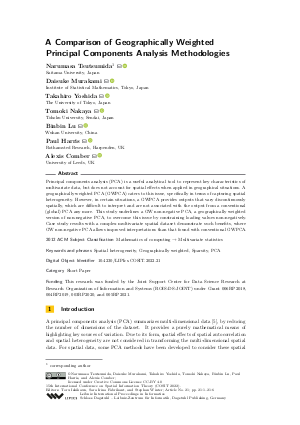A Comparison of Geographically Weighted Principal Components Analysis Methodologies (Short Paper)
Authors
Narumasa Tsutsumida  ,
Daisuke Murakami
,
Daisuke Murakami  ,
Takahiro Yoshida
,
Takahiro Yoshida  ,
Tomoki Nakaya
,
Tomoki Nakaya  ,
Binbin Lu
,
Binbin Lu  ,
Paul Harris
,
Paul Harris  ,
Alexis Comber
,
Alexis Comber 
-
Part of:
Volume:
15th International Conference on Spatial Information Theory (COSIT 2022)
Part of: Series: Leibniz International Proceedings in Informatics (LIPIcs)
Part of: Conference: Conference on Spatial Information Theory (COSIT) - License:
 Creative Commons Attribution 4.0 International license
Creative Commons Attribution 4.0 International license
- Publication Date: 2022-08-22
File

PDF
LIPIcs.COSIT.2022.21.pdf
- Filesize: 0.64 MB
- 6 pages
Document Identifiers
Subject Classification
ACM Subject Classification
- Mathematics of computing → Multivariate statistics
Keywords
- Spatial heterogeneity
- Geographically weighted
- Sparsity
- PCA
Metrics
- Access Statistics
-
Total Accesses (updated on a weekly basis)
0Document
0Metadata
Abstract
Principal components analysis (PCA) is a useful analytical tool to represent key characteristics of multivariate data, but does not account for spatial effects when applied in geographical situations. A geographically weighted PCA (GWPCA) caters to this issue, specifically in terms of capturing spatial heterogeneity. However, in certain situations, a GWPCA provides outputs that vary discontinuously spatially, which are difficult to interpret and are not associated with the output from a conventional (global) PCA any more. This study underlines a GW non-negative PCA, a geographically weighted version of non-negative PCA, to overcome this issue by constraining loading values non-negatively. Case study results with a complex multivariate spatial dataset demonstrate such benefits, where GW non-negative PCA allows improved interpretations than that found with conventional GWPCA.
Cite As Get BibTex
Narumasa Tsutsumida, Daisuke Murakami, Takahiro Yoshida, Tomoki Nakaya, Binbin Lu, Paul Harris, and Alexis Comber. A Comparison of Geographically Weighted Principal Components Analysis Methodologies (Short Paper). In 15th International Conference on Spatial Information Theory (COSIT 2022). Leibniz International Proceedings in Informatics (LIPIcs), Volume 240, pp. 21:1-21:6, Schloss Dagstuhl – Leibniz-Zentrum für Informatik (2022)
https://doi.org/10.4230/LIPIcs.COSIT.2022.21
BibTex
@InProceedings{tsutsumida_et_al:LIPIcs.COSIT.2022.21,
author = {Tsutsumida, Narumasa and Murakami, Daisuke and Yoshida, Takahiro and Nakaya, Tomoki and Lu, Binbin and Harris, Paul and Comber, Alexis},
title = {{A Comparison of Geographically Weighted Principal Components Analysis Methodologies}},
booktitle = {15th International Conference on Spatial Information Theory (COSIT 2022)},
pages = {21:1--21:6},
series = {Leibniz International Proceedings in Informatics (LIPIcs)},
ISBN = {978-3-95977-257-0},
ISSN = {1868-8969},
year = {2022},
volume = {240},
editor = {Ishikawa, Toru and Fabrikant, Sara Irina and Winter, Stephan},
publisher = {Schloss Dagstuhl -- Leibniz-Zentrum f{\"u}r Informatik},
address = {Dagstuhl, Germany},
URL = {https://drops.dagstuhl.de/entities/document/10.4230/LIPIcs.COSIT.2022.21},
URN = {urn:nbn:de:0030-drops-169062},
doi = {10.4230/LIPIcs.COSIT.2022.21},
annote = {Keywords: Spatial heterogeneity, Geographically weighted, Sparsity, PCA}
}
Author Details
Funding
This research was funded by the Joint Support Center for Data Science Research at Research Organization of Information and Systems (ROIS-DS-JOINT) under Grant 006RP2018, 004RP2019, 003RP2020, and 005RP2021.
References
- Chris Brunsdon, A Stewart Fotheringham, and Martin E Charlton. Geographically Weighted Regression: A Method for Exploring Spatial Nonstationarity. Geogr. Anal., 28(4):281-298, September 1996. URL: https://doi.org/10.1111/j.1538-4632.1996.tb00936.x.
- Urška Demšar, Paul Harris, Chris Brunsdon, A. Stewart Fotheringham, and Sean McLoone. Principal Component Analysis on Spatial Data: An Overview. Ann. Assoc. Am. Geogr., 103(1):106-128, January 2013. URL: https://doi.org/10.1080/00045608.2012.689236.
- Isabella Gollini, Binbin Lu, Martin Charlton, Christopher Brunsdon, and Paul Harris. GWmodel : An R Package for Exploring Spatial Heterogeneity Using Geographically Weighted Models. J. Stat. Softw., 63(17):85-101, April 2015. URL: https://doi.org/10.18637/jss.v063.i17.
- Paul Harris, Chris Brunsdon, and Martin Charlton. Geographically weighted principal components analysis. Int. J. Geogr. Inf. Sci., 25(10):1717-1736, October 2011. URL: https://doi.org/10.1080/13658816.2011.554838.
- Ian Jolliffe. Principal Component Analysis. In Wiley StatsRef Stat. Ref. Online. John Wiley & Sons, Ltd, Chichester, UK, September 2014. URL: https://doi.org/10.1002/9781118445112.stat06472.
- T. Jombart, S. Devillard, A. B. Dufour, and D. Pontier. Revealing cryptic spatial patterns in genetic variability by a new multivariate method. Heredity (Edinb)., 101(1):92-103, 2008. URL: https://doi.org/10.1038/hdy.2008.34.
- Christopher D. Lloyd. Analysing population characteristics using geographically weighted principal components analysis: A case study of Northern Ireland in 2001. Comput. Environ. Urban Syst., 34(5):389-399, 2010. URL: https://doi.org/10.1016/j.compenvurbsys.2010.02.005.
-
Peter Rousseeuw. Multivariate Estimation with High Breakdown Point, 1985.

- Christian D. Sigg and Joachim M. Buhmann. Expectation-maximization for sparse and non-negative PCA. In Proc. 25th Int. Conf. Mach. Learn. - ICML '08, pages 960-967, New York, New York, USA, 2008. ACM Press. URL: https://doi.org/10.1145/1390156.1390277.
- Narumasa Tsutsumida, Paul Harris, and Alexis Comber. The Application of a Geographically Weighted Principal Component Analysis for Exploring Twenty-three Years of Goat Population Change across Mongolia. Ann. Am. Assoc. Geogr., 107(5):1060-1074, 2017. URL: https://doi.org/10.1080/24694452.2017.1309968.
- Narumasa Tsutsumida, Daisuke Murakami, Takahiro Yoshida, Tomoki Nakaya, Binbin Lu, and Paul Harris. Geographically Weighted Non-negative Principal Components Analysis for Exploring Spatial Variation in Multidimensional Composite Index. GeoComputation 2019, September 2019. URL: https://doi.org/10.17608/k6.auckland.9850826.v1.
